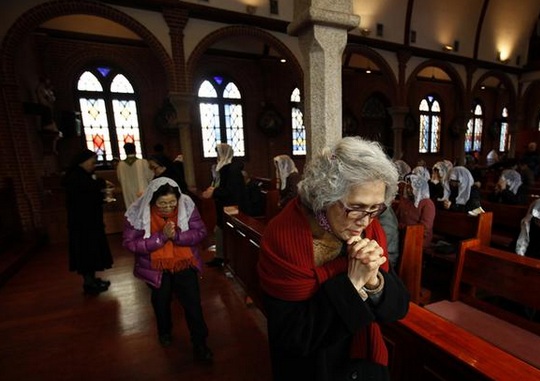For Lent, Christians asked to remember Christ's suffering, people in need

Leaders of Anglican churches are encouraging the faithful to mark the austere six-week Lent season ahead of the celebration of Christ's resurrection on Easter with a focus on the suffering of Jesus and that of people in need.
Lent is a traditional season of repentance, fasting and preparation for the coming of Easter. It lasts forty days, excluding Sundays.
The period is generally observed by Roman Catholic, Eastern and some Protestant churches. In Western churches, Lent begins this year on February 13 and ends just before Easter on March 30.
For the leader of the only Anglican church in Iraq, Lent will be an "intense time" that will recall Christ's suffering on the cross.
"For all in this land Lent is combined with the fast of Niniveh and is an intense time of giving thanks to the Lord," wrote Canon Andrew Right in a special reflection to mark the launch of a Lent 2013 app from Church House Publishing.
"In the midst of our immense suffering we remember the suffering of our Lord, culminating in his intense suffering on the Cross. That time though was also his greatest time of glory and also our greatest time of glory. So this is a time when we all draw near to God and He draws near to us. There is no better time to do this than to find time to reflect."
The head of the U.S. Episcopal Church, the Most Rev. Katharine Jefferts Schori, issued a Lenten reflection on Monday, focusing on consciousness in eating and solidarity with those who are not just physically hungry, but those who "ache for recognition and dignity, those who struggle for peace.
"That's really more what fasting is about than giving up chocolate. Being conscious of what you eat, standing in solidarity with those who are hungry, whether it is for food, or shelter, or peace, or dignity, or recognition, or for love," she said.
She noted how many U.S. leaders have engaged in an act of solidarity with the poor by trying to live for a week on a food budget allocated by government welfare offices, about $4 a person per day.
"An act of solidarity like that might increase your consciousness about those who go hungry, it might increase your own consciousness about what you eat, and it might provide an opportunity to share some of your largesse, some of what you save from that kind of eating with those who go without," she said.
She said the violence in the U.S. and around the world "is most often an act in response to those who don't have enough.
"Those who are hungry, those who ache for recognition and dignity, those who struggle for peace," she said.'
The Church of England said on Tuesday that in keeping with tradition, worshippers' foreheads will be marked in ash with the Sign of the Cross, from the ashes of burnt palm crosses, "as a sign of the spirit of penitence with which the season of Lent is kept."
One Anglican leader, the Bishop of Dudley, Rt. Rev. David Walker will be with members of churches in central England offer to say a prayer for people they meet on the street.
The bishop will be collecting prayers as part of the team in Stourbridge.
"We know that people really appreciate somebody offering to say a prayer for them," he said. "In the past we have collected over 120 prayer requests in two hours in one location. We'll be collecting prayers for whatever concerns the people we meet and we believe that prayer can make a real difference."